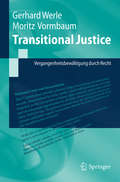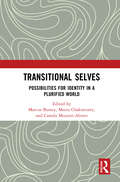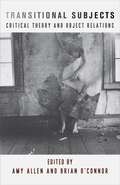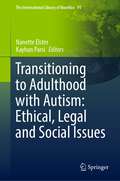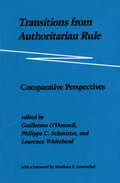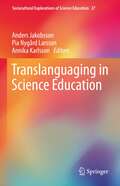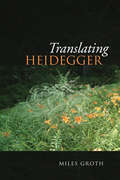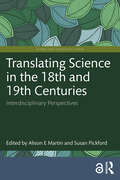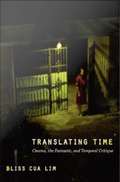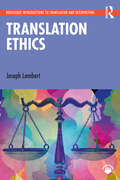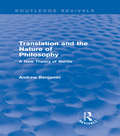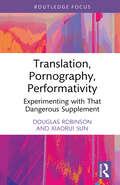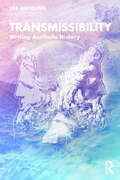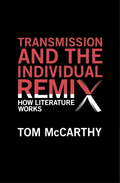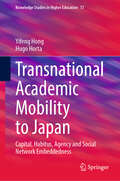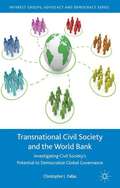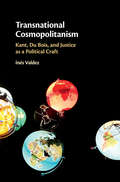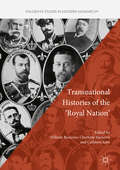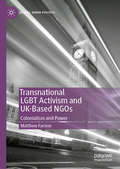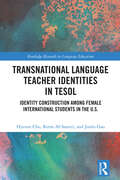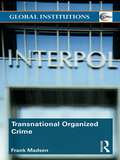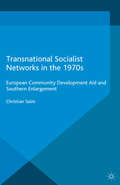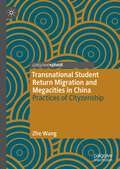- Table View
- List View
Transitional Justice: Vergangenheitsbewältigung durch Recht (Springer-Lehrbuch)
by Gerhard Werle Moritz VormbaumDieses Buch bietet die erste systematische Gesamtdarstellung zum Thema Transitional Justice in deutscher Sprache. Der Ausdruck „Transitional Justice“ hat sich zum Ende des Kalten Krieges beim Übergang von Diktaturen zur Demokratie etabliert und dient als Leitbegriff zur Aufarbeitung von Systemunrecht. Das vorliegende Werk entwickelt die Grundprinzipien von Transitional Justice und behandelt die fünf wesentlichen Aufarbeitungsoptionen – Strafverfolgung, Amnestien, Wahrheitskommissionen, Wiedergutmachung sowie die Überprüfung des öffentlichen Dienstes. Aktuelle Herausforderungen werden diskutiert. Reichhaltiges Anschauungsmaterial beleuchtet über 50 Aufarbeitungssituationen. Das Buch verfolgt einen doppelten Zweck: Es soll zum einen Rechtswissenschaftlerinnen und Rechtswissenschaftlern sowie praktisch tätigen Juristinnen und Juristen den Zugang zur Materie erleichtern. Zum anderen soll es benachbarten Disziplinen einen konzentrierten Einblick in die rechtlichen Leitprinzipien von Transitional Justice ermöglichen.
Transitional Selves: Possibilities for Identity in a Plurified World
by Marcus Bussey, Meera Chakravorty, and Camila Mozzini-AlisterThis book engages with the ethics and practices of identity formation in a world experiencing identity stress. It engages with crucial questions such as: What models are shaping our view of ourselves and the society in which we live? What images ground our perception of what is true and real? How have the images been historically produced? What are the effects of such models on definitions of self? Should we break free from these images if we get to know what they are? Is it possible to change our models in order to create freer identities? Through a range of distinctive lenses, the essays in the volume deals with the ideas of the ‘liminal self’, the ‘digital self’, ‘identities in flux’, and offers up ‘anthropologies of self/selves’ that situates current identity processes within their cultures and explores strategies and dilemmas from this perspective. This key volume will be of interest to scholars and researchers of literary stories, critical theory, social theory, social anthropology, philosophy, and political philosophy.
Transitional Subjects: Critical Theory and Object Relations (New Directions in Critical Theory #67)
by Amy Allen Axel Honneth C. Fred Alford James Martel Owen Hulatt Joel Whitebook Johanna Meehan Noëlle McAfee Alessandro Ferrera Sara BeardsworthCritical social theory has long been marked by a deep, creative, and productive relationship with psychoanalysis. Whereas Freud and Fromm were important cornerstones for the early Frankfurt School, recent thinkers have drawn on the object-relations school of psychoanalysis. Transitional Subjects is the first book-length collection devoted to the engagement of critical theory with the work of Melanie Klein, Donald Winnicott, and other members of this school. Featuring contributions from some of the leading figures working in both of these fields, including Axel Honneth, Joel Whitebook, Noëlle McAfee, Sara Beardsworth, and C. Fred Alford, it provides a synoptic overview of current research at the intersection of these two theoretical traditions while also opening up space for further innovations.Transitional Subjects offers a range of perspectives on the critical potential of object-relations psychoanalysis, including feminist and Marxist views, to offer valuable insight into such fraught social issues as aggression, narcissism, “progress,” and torture. The productive dialogue that emerges augments our understanding of the self as intersubjectively and socially constituted and of contemporary “social pathologies.” Transitional Subjects shows how critical theory and object-relations psychoanalysis, considered together, have not only enriched critical theory but also invigorated psychoanalysis.
Transitioning to Adulthood with Autism: Ethical, Legal and Social Issues (The International Library of Bioethics #91)
by Nanette Elster Kayhan ParsiThis book offers the first ever book-length treatment of the topic of transitioning from adolescence to adulthood with autism and the attendant ethical, legal and social issues for the individual as well as caregivers and professionals. It features experts in a variety of areas (law, bioethics, philosophy, pediatrics, neurology, medicine, psychology, special education, social work, employment, civic participation, social media) who provide commentary on these areas and the relevant ethical/legal/social challenges young autistic adults face in these different areas. This is an indispensable read for educators, therapists, and other professionals who work in transition with young autistic adults.
Transitions from Authoritarian Rule: Comparative Perspectives
by Laurence Whitehead Guillermo O’Donnell Philippe C. SchmitterAn array of internationally noted scholars examines the process of democratization in Southern Europe and Latin America. The authors provide new interpretations of both current and historical efforts of nations to end periods of authoritarian rule and to initiate transition to democracy, efforts that have met with widely varying degrees of success and failure. Extensive case studies of individual countries, a comparative overview, and a synthesis conclusions offer important insights for political scientists, students, and all concerned with the prospects for democracy. In Volume 3, despite the unique contexts of transitions in individual countries, significant points of comparison emerge — such as the influence of foreign nations and the role of agents outside the government. These analyses explore both intra- and interregional similarities and differences.
Translanguaging in Science Education (Sociocultural Explorations of Science Education #27)
by Anders Jakobsson Pia Nygård Larsson Annika KarlssonThis edited volume explores diverse translanguaging practices in multilingual science classrooms in Hong Kong, Lebanon, Luxembourg, South Africa, Sweden and the United States. It presents novel opportunities for using students’ home, first or minority languages as meaning-making tools in science education. It also invites to explore the use of language resources and other multimodal resources, such as gestures and body language. In addition, it discusses and problematizes contingent hindrances and obstacles that may arise from these practices within various contexts around the world. This includes reviewing different theoretical starting points that may be challenged by such an approach. These issues are explored from different perspectives and methodological focus, as well as in several educational contexts, including primary, middle, secondary levels, higher education, as well as in after-school programs for refugee teenagers. Within these contexts, the book highlights and shares a range of educational tools and activities in science education, such as teacher-led classroom-talk, language-focused teaching, teachers’ use of meta-language, teachers’ scaffolding strategies, small-group interactions, and computer-supported collaborative learning.
Translating Feminism: Interdisciplinary Approaches to Text, Place and Agency (Palgrave Studies in Language, Gender and Sexuality)
by Kristina Schulz Penelope Morris Maud Anne Bracke Julia C. BullockThis edited book addresses the diversity across time and space of the sites, actors and practices of feminist translation from 1945-2000. The contributors examine what happens when a politically motivated text is translated linguistically and culturally, the translators and their aims, and the strategies employed when adapting texts to locally resonating discourses. The collection aims to answer these questions through case studies and a conceptual rethinking of the process of politically engaged translation, considering not only trained translators and publishers, but also feminist activists and groups, NGOs and writers. The book will be of interest to students and researchers in the fields of translation studies, gender/women's studies, literature and feminist history.
Translating Heidegger
by Miles GrothDespite Martin Heidegger’s influence on twentieth-century philosophy, understanding his way of thinking is difficult if one relies solely on the English translations of his work. Since Gilbert Ryle misjudged his work in a 1929 review of Sein und Zeit, Heidegger’s philosophy has remained an enigma to many scholars who cannot read the original German texts. In Translating Heidegger, Groth points to mistranslations as the root cause of misunderstanding Heidegger. Translators have not achieved clarity regarding Heidegger’s fundamental words, an understanding of which is crucial to gaining access to his thought. Having been mistranslated from the ancient Greek into Latin and then into modern European languages, Heidegger’s philosophies have largely been obscured for two millennia. In this unique study, Groth examines the history of the first English translations of Heidegger’s works and reveals the elements of Heidegger’s philosophy of translation, showing it at work in Heidegger’s radical translation of Parmenides, Fragment VI.
Translating Science in the 18th and 19th Centuries: Interdisciplinary Perspectives (Science and Technology Studies)
by Alison E. Martin and Susan PickfordThis book explores the role of translation in shaping the knowledge-sharing processes that were and are seminal to scientific endeavour. It considers the mechanisms by which eighteenth- and nineteenth-century European science writing travelled within and beyond its home continent and non- European science was taken up in a colonial context. Using insights from fields of research including book history and textual studies to investigate the paratextual framing, stylistic choices, rhetorical devices, and modes of expression deployed by scientific writers – key to shaping a work’s credibility and its author’s integrity –it argues that translators are central, yet largely overlooked, mediators in this creative process.Encompassing West Africa, China, the Middle East, India, South America, Europe, and the Ottoman Empire, this volume comprises case studies working with around a dozen different languages to gain a sense of how scientific narratives were evolving both within and across an increasingly global intellectual commons in a key period in the development of the natural sciences, medicine, and technology.Part of the Science and Technology Studies series, the volume will be indispensable for scholars and researchers of science and technology studies, philosophy of science, translation studies, gender studies, English literature, and philosophy in general.
Translating Time: Cinema, the Fantastic, and Temporal Critique
by Bliss Cua LimUnder modernity, time is regarded as linear and measurable by clocks and calendars. Despite the historicity of clock-time itself, the modern concept of time is considered universal and culturally neutral. What Walter Benjamin called "homogeneous, empty time" founds the modern notions of progress and a uniform global present in which the past and other forms of time consciousness are seen as superseded. In Translating Time, Bliss Cua Lim argues that fantastic cinema depicts the coexistence of other modes of being alongside and within the modern present, disclosing multiple "immiscible temporalities" that strain against the modern concept of homogeneous time. In this wide-ranging study--encompassing Asian American video (On Cannibalism), ghost films from the New Cinema movements of Hong Kong and the Philippines (Rouge, Itim, Haplos), Hollywood remakes of Asian horror films (Ju-on, The Grudge, A Tale of Two Sisters) and a Filipino horror film cycle on monstrous viscera suckers (Aswang)--Lim conceptualizes the fantastic as a form of temporal translation. The fantastic translates supernatural agency in secular terms while also exposing an untranslatable remainder, thereby undermining the fantasy of a singular national time and emphasizing shifting temporalities of transnational reception. Lim interweaves scholarship on visuality with postcolonial historiography. She draws on Henri Bergson's understanding of cinema as both implicated in homogeneous time and central to its critique, as well as on postcolonial thought linking the ideology of progress to imperialist expansion. At stake in this project are more ethical forms of understanding time that refuse to domesticate difference as anachronism. While supernaturalism is often disparaged as a vestige of primitive or superstitious thought, Lim suggests an alternative interpretation of the fantastic as a mode of resistance to the ascendancy of homogeneous time and a starting-point for more ethical temporal imaginings.
Translation Ethics (Routledge Introductions to Translation and Interpreting)
by Joseph LambertTranslation Ethics introduces the topic of ethics for students, researchers, and professional translators. Based on a successful course and written by an experienced instructor, the Introduction and nine core chapters offer an accessible examination of a wide range of interlocking topic areas, which combine to form a cohesive whole, guiding students through the key debates. Built upon a theoretical background founded in philosophy and moral theory, it outlines the main contributions in the area and traces the development of thought on ethics from absolutism to relativism, or, from staunchly-argued textual viewpoints to current lines of thought placing the translator as agent and an active – even interventionary – mediator. The textbook then examines the place of ethical enquiry in the context of professional translation, critiquing provision such as codes of ethics. Each chapter includes key discussion points, suggested topics for essays, presentations, or in-class debates, and an array of contextualised examples and case studies. Additional resources, including videos, weblinks, online activities, and PowerPoint slide presentations on the Routledge Translation studies portal provide valuable extra pedagogical support. This wide-ranging and accessible textbook has been carefully designed to be key reading for a wide range of courses, including distance-learning courses, from translation and interpreting ethics to translation theory and practice.
Translation and the Nature of Philosophy: A New Theory of Words (Routledge Revivals)
by Andrew BenjaminThis engrossing study, first published in 1989, explores the basic mutuality between philosophy and translation. By studying the conceptions of translation in Plato, Seneca, Davidson, Walter Benjamin and Freud, Andrew Benjamin reveals the interplay between the two disciplines not only in their relationship to language, but also at a deeper, cognitive level. Benjamin engages throughout with the central tenets of post-structuralism: the concept of a constant yet illusive ‘true’ meaning has lost authority, but remains a problem. The fact of translation seems to defy the notion that ‘meaning’ is reducible to its component words; yet, to say that the ‘truth’ is more than the sum of its parts, we are challenging the very foundations of what it is to communicate, to understand, and to know. In Translation and the Nature of Philosophy, the author sets out his own theory of language in light of these issues.
Translation, Pornography, Performativity: Experimenting with That Dangerous Supplement (Routledge Advances in Translation and Interpreting Studies)
by Douglas Robinson Xiaorui SunRobinson and Sun’s book goes in search of the neglected metaphorics of translation in pornography using poststructuralist rethinkings and reframings of porn (and masturbation) from Jacques Derrida to Judith Butler.In his 1684 “Essay on Translated Verse,” the Earl of Roscommon attacked “want of decency” in translation metaphorically by comparing it to picking up prostitutes in the park (“raking the park for stews”) instead of hanging out with “troops of faultless nymphs.” Sex work, and the graphic representation of sex work that Nathaniel Butler was the first to call “pornography” in print in 1638, is used as a metaphor for non-normative translation, which in Robinson and Sun’s hands becomes experimental translation.En route to that goal, the authors take us through Butler on performativity and resistance, Derrida on supplementarity and iterability, and Haun Saussy’s innovative application of Derridean citationality to the use of a target-cultural “sponsor” or “bondsman” for translation. They take detours through Charles Baudelaire’s “Une charogne” and J.G. Ballard’s “The Drowned Giant.”They deal with the performativity of pornography (and translatography) in Part I, the “unnatural” iterability of masturbation (and translation) in Part II, and experimental translation in Part III.The theory-littered path this book takes through the metaphorics of translation will be of interest to scholars and students of translation studies, especially experimental translation and translation theory, but also media scholars interested in the philosophical complexities of performativity.
Transmissibility: Writing Aesthetic History
by Jae EmerlingThis book examines transmissibility to remind us why the vitality and epistemic significance of an artwork is anachronistic and futural. Transmissibility: Writing Aesthetic History performs a transdisciplinary philosophy of aesthetic history via the work of Gilles Deleuze and Félix Guattari, Cy Twombly, Marina Abramović, Paul Celan, Cecil Taylor, Italo Calvino, Candida Höfer, and others by focusing on theartistic and historiographic labor that differentiates artworks from other modes of creation.
Transmission and the Individual Remix
by Tom MccarthySub-titled "How Literature Works" this essay by the renown novelist is a provocative and entertaining work of postmodern theory that re-evaluates literature and literary meaning from Aeschylus to Kraftwerk. A VINTAGE EBOOK ORIGINAL.Tom McCarthy is one of the most vital young voices in contemporary literature, and in this essay he identifies the signals that have been repeating, pulsing, modulating in the airspace of the novel, poem, play--in their lines, between them and around them--since each of these forms began. Tom takes us back to the Greeks and the origins of literary meaning to show that information, rather than being a natural or abstract phenomenon, is always based in artificial media--in ones and zeros, dots and dashes, signals and noise. He takes us through Ovid, Rilke, Conrad, Joyce, Beckett, and others to re-imagine the very idea of what a writer does, and what the act of writing is. Rather than praising individual creative genius, Tom re-tunes our ears to the crackle of information as it has passed through the feedback loop of literary culture.
Transnational Academic Mobility to Japan: Capital, Habitus, Agency and Social Network Embeddedness (Knowledge Studies in Higher Education #17)
by Hugo Horta Yifeng HongThis book addresses agency and habitus development of migrant academics in Japan and reveals the complexity of international academic mobility in East Asian contexts. It addresses differentiated transnational academic mobility routes and route-confined capitals and dispositions, the effect of stratified social networks and network embeddedness on international academic mobility, and the effect of unequal globalization and the asymmetrical internationalization of international academic mobility. The book highlights the roles of transnationally stretched social network development and network embeddedness along life trajectories, locating them as critical infrastructures of mobilities and identifying an array of individual social network building and maintenance strategies and principles. It illustrates how familial, educational, academic and social networks across borders facilitate and channel flows of capitals and resources vital for academic performance and upward academic mobility of migrated academics. It draws on a range of theoretical frameworks of Bourdieusian theory of sociology, transnationalism and qualitative social network analysis. The research is based on 26 case studies of migrant scholars in Japan, using narrative inquiry and qualitative social network analysis. The work provides multiple implications for practitioners, policy makers and researchers who seek answers to the sustainability of the internationalization of higher education in Asia Pacific and emerging higher education hubs.
Transnational Civil Society and the World Bank
by Christopher L. PallasTransnational civil society is often seen as an important contributor to the democratization of global governance. In their engagement with the World Bank, however, transnational civil society organizations prioritize pre-existing mission over responsiveness to claimed stakeholders and undercut the authority of developing country governments.
Transnational Cosmopolitanism: Kant, Du Bois, and Justice as a Political Craft
by Inés ValdezBased on the theoretical reconstruction of neglected post-WWI writings and political action of W. E. B. Du Bois, this volume offers a normative account of transnational cosmopolitanism. Pointing out the limitations of Kant's cosmopolitanism through a novel contextual account of Perpetual Peace, Transnational Cosmopolitanism shows how these limits remain in neo-Kantian scholarship. Inés Valdez's framework overcomes these limitations in a methodologically unique way, taking Du Bois's writings and his coalitional political action both as text that should inform our theorization and normative insights. The cosmopolitanism proposed in this work is an original contribution that questions the contemporary currency of Kant's canonical approach and enlists overlooked resources to radicalize, democratize, and transnationalize cosmopolitanism.
Transnational Histories of the 'Royal Nation'
by Milinda Banerjee Charlotte Backerra Cathleen SartiThis book challenges existing accounts of the nineteenth and twentieth centuries in which political developments are explained in terms of the rise of the nation-state. While monarchies are often portrayed as old-fashioned - as things of the past - we argue that modern monarchies have been at the centre of nation-construction in many parts of the world. Today, roughly a quarter of states define themselves as monarchies as well as nation-states - they are Royal Nations. This is a global phenomenon. This volume interrogates the relationship between royals and 'their' nations with transnational case studies from Asia, Africa, Europe as well as South America. The seventeen contributors discuss concepts and structures, visual and performative representations, and memory cultures of modern monarchies in relation to rising nationalist movements. This book thereby analyses the worldwide significance of the Royal Nation.
Transnational LGBT Activism and UK-Based NGOs: Colonialism and Power (Global Queer Politics)
by Matthew FarmerThis book contributes an analysis of UK-based non-governmental organisations engaged in transnational lesbian, gay, bisexual, and trans (LGBT) activism, within a broader recognition of the complexities that British colonial legacies perpetuate in contemporary international relations. From this analysis, the book suggests that greater engagement with intersectional and decolonial approaches to transnational activism would allow for a more transformative solidarity that challenges the broader impacts of coloniality on LGBT people’s lives globally. Case studies are used to explore UK actors’ participation in the complexities of contemporary transnational LGBT activism, including activist responses to developments in Brunei between 2014 and 2019, and the use of LGBT aid conditionality by Western governments. Activist engagements with legacies of British colonialism are also explored, including a focus on ‘sodomy laws’ and the Commonwealth, as well as the challenges faced by LGBT people seeking asylum in the UK.
Transnational Language Teacher Identities in TESOL: Identity Construction Among Female International Students in the U.S. (Routledge Research in Language Education)
by Hyesun Cho Reem Al-Samiri Junfu GaoDrawing on Bakhtin’s notion of ideological becoming and the concepts of intersectionality and transnationalism, this volume offers a unique conceptual framework to explore and better understand the identity construction and negotiation of international TESOL students. Focusing on female graduate students studying in the U.S., the text utilizes rich narratives to illustrate how nuanced language teacher identities develop through complex dialogic processes relating to language, race, and gender—as well as migration experiences—and individuals’ integration in academic and professional communities. Ultimately, the text contests deficit reductionist views of transnational students that are implied by educational policies and administration. This text will benefit scholars, academics, and students in the fields of bilingualism, TESOL, multicultural education, and language identity more broadly. Those involved with teaching and teacher education, as well as language and culture in general, will also benefit from this book.
Transnational Legal Ordering and State Change
by Gregory ShafferLaw can no longer be viewed through a purely national lens. Transnational legal ordering affects the boundary of the state and the market, the allocation of power among national institutions, the role of professions and their expertise, and associational patterns that provide new normative frames. This book breaks new ground for understanding the impacts of transnational legal ordering within nation-states in today's globalized world. The book addresses the different dimensions of state change at stake and the factors that determine these impacts. It brings together leading scholars from sociology and law who study the effects of transnational legal ordering within different countries. Their case studies illustrate how transnational legal ordering interacts with national law and institutions in different regulatory areas, and cover anti-money laundering, bankruptcy, competition, education, intellectual property, health, and municipal water law and policy in different countries. The book explains the extent and limits of transnational legal ordering in today's world.
Transnational Organized Crime
by Frank MadsenWith organized crime estimated to generate billions of dollars every year through illegal activities such as money laundering, smuggling of people and goods, extortion, robbery, fraud and insider trading, authorities are increasingly working together to combat this increasing threat to international security and stability. In this book former police officer Frank Madsen provides a much needed, short and accessible introduction to transnational organized crime, explaining its history and the key current issues and clearly examining the economics and practices of crime in the era of globalization. Key issues discussed include: the war on drugs anti-money laundering efforts the relationship between organized crime and terrorism development of ‘Internet based’ criminal activity international response to transnational organized crime. Illustrated by a series of researched case studies from around the world, Transnational Organized Crime is essential reading for all students and researchers in International Relations, International Law and Criminology.
Transnational Socialist Networks in the 1970s: European Community Development Aid and Southern Enlargement (Palgrave Studies in the History of Social Movements)
by Christian SalmTransnational Socialist Networks in the 1970s argues that western European socialist parties' transnational cooperation across national borders significantly influenced politics and policy-making in what was the European Communities (EC). It focuses on the network-like informal structures that characterised transnational cooperation between the party members and leaders of different socialist parties involved in European affairs. Taking the example of two case studies, namely EC development aid policy and EC southern enlargement policy, the book demonstrates that the socialist parties strengthened their informal transnational network structures for the purposes of debating ideological and programmatic issues and finding policy solutions to common challenges in both policy fields. Moreover, it shows that the networks developed various functions to influence European governance. Against this background, the analysis in this book makes not only a significant contribution to the study of transnational networks of western European socialist parties and the history of European integration, but also adds to the understanding of the role of transnational networks in European politics and policy-making.
Transnational Student Return Migration and Megacities in China: Practices of Cityzenship
by Zhe WangThis book is a study of the return migration of overseas Chinese students. By 2018, over 3.5 million Chinese students had returned from overseas universities to China, with the megacities of Beijing, Shanghai, and Shenzhen representing by far their main destinations. In other words, when overseas students return to China, many do not return to their hometown but usually land, work and settle down in Beijing, Shanghai and Shenzhen. Their return migration is thus not only transnational, but also internal-urban. This book adopts a multi-level geographical analysis to explore this important phenomenon, exploring why and how returnees choose these three cities and how they experience and interpret their everyday lives in these megacities after their return. In doing so, it highlights the importance of cultural logics and multiscalar thinking of transnational Chinese students’ return migration and illuminates how their transnational migration reproduces domestic socio-spatial inequalities. This book brings an important contribution to the fields of Cultural Geography, Urban Geography, Transnationalism, Migration Studies and Citizenship Studies.
